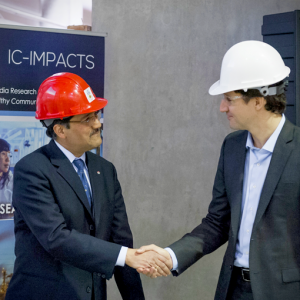On March 4, 2015, Liberal Party leader Justin Trudeau visited the Civil Engineering Structures Laboratory at the University of British Columbia (UBC) to learn more about the infrastructure research IC-IMPACTS is conducting. Interested in the future of infrastructure, Mr. Trudeau was shown how innovative sensors that IC-IMPACTS is currently developing can help monitor the health and integrity of pipes and structures today.
With Canada pledging to spend $5.8 billion on improving infrastructure across the country, advancements in how Canadians monitor and maintain infrastructure has become increasingly significant.
 IC-IMPACTS CEO Dr. Nemy Banthia showcased new techniques in structural health monitoring by demonstrating pipeline stress and corrosion. The infrastructure lab was set up with a large, 18-inch wide steel pipe that would typically be found carrying oil above ground in Canada. However this pipe was fitted with 10 different state-of-the-art sensors measuring displacement, corrosion, and strain, all while displaying changes in measurements on a screen in real time. As a large machine applied pressure and downward force on the pipe, the sensors wirelessly transmitted data to a computer and showed the pressure and strain of the pipe changing in real-time.
IC-IMPACTS CEO Dr. Nemy Banthia showcased new techniques in structural health monitoring by demonstrating pipeline stress and corrosion. The infrastructure lab was set up with a large, 18-inch wide steel pipe that would typically be found carrying oil above ground in Canada. However this pipe was fitted with 10 different state-of-the-art sensors measuring displacement, corrosion, and strain, all while displaying changes in measurements on a screen in real time. As a large machine applied pressure and downward force on the pipe, the sensors wirelessly transmitted data to a computer and showed the pressure and strain of the pipe changing in real-time.
The demonstration helped simulate how advanced sensors could help monitor both future and existing pipelines remotely. Pipelines fitted with these sensors could wirelessly transmit relevant data to a control station miles away.
By remotely sensing the integrity of pipelines and structures, technicians can detect when these structures are becoming unsafe and can better prevent disasters.
Impressed with the demonstration, Mr. Trudeau later tweeted “Terrific to see cutting-edge research being done at @ICIMPACTS. Canada must do more to support innovative R&D.”
2024 IC-IMPACTS Conference in Delhi December 9 - 11, 2024 New Delhi, India